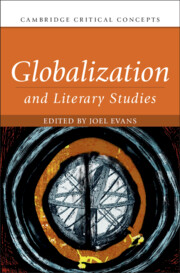Book contents
- Globalization and Literary Studies
- Cambridge Critical Concepts
- Globalization and Literary Studies
- Copyright page
- Contents
- Figures
- Tables
- Contributors
- Acknowledgements
- Introduction
- Part I Origins
- Part II Development
- Part III Application
- Chapter 15 The Globalization of the Enclave
- Chapter 16 Geopolitics and the Novel
- Chapter 17 Spy Fiction in the Age of the Global
- Chapter 18 The Twenty-First-Century Global Slave Narrative Trade
- Chapter 19 Planetary Poetics
- Chapter 20 Addressing Globalization in the Anthropocene
- References
- Index
Chapter 20 - Addressing Globalization in the Anthropocene
from Part III - Application
Published online by Cambridge University Press: 01 April 2022
- Globalization and Literary Studies
- Cambridge Critical Concepts
- Globalization and Literary Studies
- Copyright page
- Contents
- Figures
- Tables
- Contributors
- Acknowledgements
- Introduction
- Part I Origins
- Part II Development
- Part III Application
- Chapter 15 The Globalization of the Enclave
- Chapter 16 Geopolitics and the Novel
- Chapter 17 Spy Fiction in the Age of the Global
- Chapter 18 The Twenty-First-Century Global Slave Narrative Trade
- Chapter 19 Planetary Poetics
- Chapter 20 Addressing Globalization in the Anthropocene
- References
- Index
Summary
This chapter argues that ‘address’, one of poetry’s most fundamental — if sometimes overlooked – dimensions, offers insights into the concepts, affects, and scales surrounding our planet’s intertwined economic and ecological systems. Analysing work by Jorie Graham, Juliana Spahr and Joshua Clover, Kathy Jetn̄il-Kijiner, Stephen Collis and Adam Dickinson, it explores poems that address a variety of subjects and entities. These include poems addressed to future generations, to geographical places, to online communities, to the human species, to the planet, and from the non-human to the human. In doing so, I show how understandings of globalization and the Anthropocene have caused a recalibration in the form as well as subject-matter of environmentally engaged poetry. This has implications for how we negotiate questions of climate change, temporality, extinction, technology, activism and agency. Now, more than ever, it matters not only what poems speak about, or even who (or what) is speaking, but to whom (or to what) they speak
Keywords
- Type
- Chapter
- Information
- Globalization and Literary Studies , pp. 318 - 333Publisher: Cambridge University PressPrint publication year: 2022

